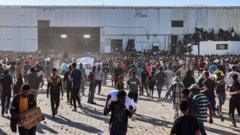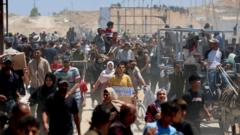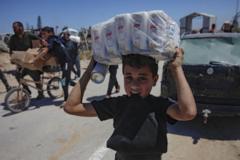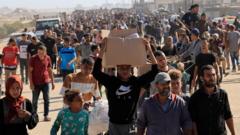The World Food Programme (WFP) highlights the dire humanitarian situation in Gaza after a break-in at a food supply warehouse led to deaths and injuries. With living conditions deteriorating due to a recent blockade, aid distribution remains critical, yet chaos ensues as desperate individuals take matters into their own hands.
Humanitarian Crisis in Gaza Escalates as Warehouse Break-In Leaves Two Dead

Humanitarian Crisis in Gaza Escalates as Warehouse Break-In Leaves Two Dead
WFP reports rising desperation in Gaza as thousands raid food supplies amid ongoing humanitarian crisis.
The United Nations' World Food Programme (WFP) has expressed alarm over a crisis in Gaza, reporting that "hordes of hungry people" stormed a food supply warehouse in central Gaza. This distressing event left two individuals dead and several others injured, as the WFP continues to verify the details of the incident. Footage from AFP showed a chaotic scene outside the Al-Ghafari warehouse in Deir Al-Balah, where large crowds forcibly accessed bags of flour and other food items amid the sound of gunfire, the source of which remains unidentified.
In an official statement, the WFP indicated that humanitarian needs in the region have "spiraled out of control" following an Israeli blockade lasting almost three months, which was only recently relaxed. "Gaza requires an urgent increase in food assistance. This is the sole method to ensure that individuals do not face starvation," the WFP cautioned. They have consistently warned of deteriorating conditions and the dangers of limiting humanitarian aid for those who are urgently in need.
On Wednesday, Israeli authorities announced the transfer of 121 trucks laden with humanitarian aid from the UN and the international community, destined for Gaza. This marked the first instance of significant aid entering the territory after the blockade was eased. Additionally, a controversial private aid distribution system known as the Gaza Humanitarian Foundation (GHF) has been launched with backing from the U.S. and Israeli governments. It employs U.S. security contractors and bypasses traditional UN channels, which the UN has criticized as both unviable and unethical.
Despite claims by U.S. and Israeli officials that the GHF is necessary to thwart potential theft of aid by Hamas—a claim that the group denies—Michael Whittall, head of the UN's humanitarian office for the Occupied Palestinian Territories, noted a lack of evidence linking Hamas to aid diversion. Instead, he pointed to criminal gangs operating near the Kerem Shalom crossing as the main perpetrators of theft since the conflict's onset.
The UN has suggested that increasing the flow of aid, similar to what was observed during the recent temporary ceasefire between Israeli forces and Hamas, would diminish the risk of looting and leverage the UN's well-established distribution networks throughout Gaza. Concurrently, the EU has critiqued Israeli airstrikes as exceeding reasonable measures to combat Hamas, further complicating an already volatile situation.




















